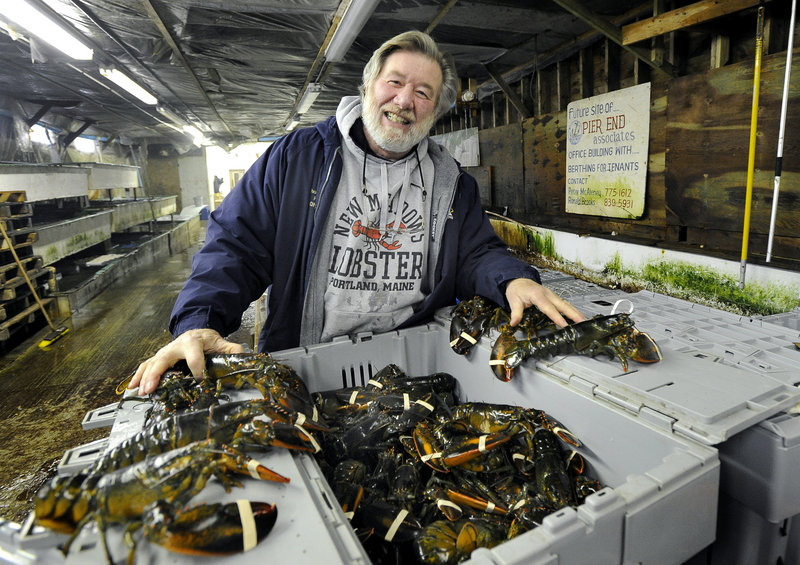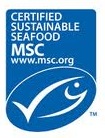Maine lobstermen have long prided themselves on their sustainable fishing practices, some of which date to the 1800s.
Today’s lobsterman throws back all egg-bearing females and undersized and oversized males and females. They fish with special ropes that won’t entangle endangered right whales. There is a limit on new commercial licenses — right now, there are about 6,000 — and each lobsterman is limited to 800 traps. Anyone entering the fishery must first go through an apprenticeship.
“It is one of the best-managed fisheries in the world,” says Robert Bayer, executive director of the Lobster Institute at the University of Maine.
But a move to have the fishery officially certified as sustainable by an international agency, the London-based Marine Stewardship Council, is causing a flap up and down the coast. Proponents say certification will keep Maine competitive in a market where retailers and customers are demanding sustainably caught seafood. But opponents, fearing a loss of autonomy and added costs, say the fishery doesn’t need any certification to prove to the world it is sustainable.
“To have somebody in England evaluating our product and our conservation and how we do things doesn’t really cut it,” said Sheila Dassatt, executive director of the Downeast Lobstermen’s Association, which represents about 300 lobstermen along the Maine coast.
At stake are the image and marketing potential of Maine’s most lucrative fishery, worth more than $300 million a year to its roughly 6,000 licensed lobstermen. They hauled in 75 million pounds of lobster in 2009, and by some estimates, the 2010 catch is expected to be close to 100 million pounds. The industry employs thousands of others as crew members and at associated businesses such as dealers, processing plants, restaurants, bait dealers and boatyards.
The Maine lobster industry has also taken a hit in recent years from high fuel prices, then softening demand at a time when landings have reached historic highs.
Leading the certification drive is the Fund for Sustainable Marine Lobster in Kennebunkport, an organization that grew out of a working group set up by then-Gov. John Baldacci in 2008 to explore certification, after Walmart, Whole Foods, Costco and other national retailers announced they were working toward selling only seafood with the Marine Stewardship Council label.
The fund is headed by John Hathaway, chief executive officer of Shucks Maine Lobster, a lobster processor in Richmond. Members include fishermen, dealers and other processors, including Linda Bean of Linda Bean’s Perfect Maine Lobster. Bean, who sells lobster to Walmart, has joined with other donors to help pay the roughly $200,000 cost of the certification process.
Hathaway said the goal is to give the Maine lobster fishery the option of certification. He said he is not sure customers would be willing to bear any increased cost the certification may add to lobster at seafood counters and restaurants. But if the market is there, he wants Maine to be ready for it.
“We want to be ahead of the curve,” said Hathaway.
Marine Stewardship Council certification is widely regarded as the gold standard for ensuring a fishery is sustainable. The council hires third-party contractors — in Maine’s case, Moody International Ltd. of England — to assess the health of the species population and whether it is overfished, the fishery’s impact on the marine environment and the fishery management system.
Since it was founded in 1997, the agency has certified 103 fisheries as sustainable. Another 134 fisheries, including the Maine lobster, are under assessment.
The process, which began in late 2008 for lobster, starts with a confidential pre-assessment, to determine whether the fishery may be eligible. About 30 percent decide not to go ahead after the pre-assessment, said Kerry Coughlin, the council’s regional director in the Americas.
Nearly all of the fisheries that enter the full assessment phase are eventually deemed certifiable, and nearly all of those renew their certifications after five years, said Coughlin.
The full assessment includes an information-gathering stage. A Moody International team came to Maine for a week in 2009 to meet with people in the industry, as well as the Maine Department of Marine Resources, which manages the state fishery. The team is continuing to seek public input.
Fisheries are generally certified with conditions which must be met if the fishery wants to be recertified after five years. Those conditions, which may require new management practices, can be costly.
Paul Knapman, coordinating the assessment for the Maine lobster fishery for Moody International, said a common condition is for a fishery to get a better understanding of its impact on the ecosystem and manage it to reduce its impact. For example, the condition for a Canadian shrimp fishery requires it to assess its impact on the seabed.
Lobstermen will not have to pay anything for certification, but businesses will if they want to be part of the supply chain, sell certified lobster and display the council’s blue label. Coughlin could not estimate what the cost could be, but she described it as “not expensive.”
Proponents say certification will open up new markets and allow Maine’s signature crustacean to keep its hold in a marketplace where consumers are increasingly demanding seafood that is harvested in an environmentally benign and responsible manner.
“It is possibly the best thing to come along in years,” said Norbert Lemieux, a Cutler lobsterman who is part of the group seeking certification.
Lemieux is convinced certification will open new markets, such as Europe, where the process has been widely embraced, and possibly put more money in lobstermen’s pockets.
Supporters say the certification will also finally guarantee that no Canadian lobster will be sold as Maine lobster, a practice that rankles those who are protective of the Maine brand.
“You don’t have to worry about someone else grabbing your identity, ” said Lemieux.
But opponents have other concerns. They are wary of any foreign agency determining whether the Maine lobster fishery is sustainable when the industry itself has already seen to it. The critics say that even though lobstermen will not have to pay anything themselves, certification will drive up costs along the supply chain that will eventually come back to rest in lobstermen’s laps.
Lobster dealer Peter McAleney, owner of New Meadows Lobster in Portland and head of the Maine Import Export Lobster Dealers Association, is against council certification — although the association itself has not taken a position.
McAleney said if any certification is needed to make Maine lobster more marketable, the process should be conducted by an in-state agency that understands the fishery, such as the Gulf of Maine Research Institute in Portland or the University of Maine.
“If you have a problem, they are right here. If there is a problem with (the Marine Stewardship Council), where do we go? To London,” he said.
McAleney contends that Maine lobster doesn’t need certification because it is already recognized as a sustainable fishery.
He said lobstermen are finally recovering from the recession, demand is back up and the fishery is working just fine without certification.
“Do they need us or do we need them? They need us. We already have done everything,” he said.
The Maine Lobstermen’s Association, which represents about 1,200 members, hasn’t taken a position on certification, and fishermen say they are waiting to see what happens.
“If they say, ‘Keep doing what you are doing,’ that’s great, but if they have opinions that we are not sustainable, they are just plain wrong,” said Jeff Putnam of Chebeague Island. He’s the chairman of the state lobster council that covers roughly the Cumberland County coastline.
It’s unclear when the lobster fishery certification assessment will be complete.
Coughlin, the council’s regional director, said the process takes an average of 12 to 15 months, but in some instances, more time is needed.
In Maine, where the assessment has entered its third year, the completion date has been pushed back at least once and it is now estimated that it will be finished by May.
Hathaway, of the Kennebunkport pro-certification group, said the organization will look at what conditions the council sets on the fishery and the costs of meeting them. He said the process may extend past May, and the group will seek more input from the industry before moving forward.
“I would say we have run the first lap and we probably have three more to go, would be my guess,” Hathaway said.
Staff Writer Beth Quimby can be contacted at 791-6363 or at:
bquimby@pressherald.com
Copy the Story Link
Send questions/comments to the editors.





Success. Please wait for the page to reload. If the page does not reload within 5 seconds, please refresh the page.
Enter your email and password to access comments.
Hi, to comment on stories you must . This profile is in addition to your subscription and website login.
Already have a commenting profile? .
Invalid username/password.
Please check your email to confirm and complete your registration.
Only subscribers are eligible to post comments. Please subscribe or login first for digital access. Here’s why.
Use the form below to reset your password. When you've submitted your account email, we will send an email with a reset code.